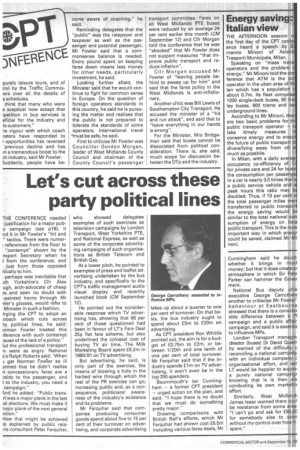Let's cut across these party political lines
Page 18

If you've noticed an error in this article please click here to report it so we can fix it.
THE CONFERENCE needed • justification for a major puby campaign (see p18), it nd it in Mr Fowler's "hit and " tactics. There were numer; references from the floor to "contempt" shown by the nsport Secretary when he I from the conference, and just from those opposed itically to him.
perhaps was inevitable that Ith Yorkshire's ClIr Alex ugh, arch-advocate of cheap 3s and seen no doubt with -painted horns through Mr vler's glasses, would refer to Minister in such a fashion. Jrging the CPT to adopt an )roach which cuts across IN/ political lines, he said: orman Fowler treated this Iference with such contempt ;ause of the lack of a policy." tut the professional transport n were as angry. National s's Ralph Roberts said: 'When .1 get Norman Fowler so ill ormed that he didn't realise it concessionary fares are a osidy to the passenger, and t to the industry, you need a campaign."
knd he added: "Public transrt was a major plank in the last :al elections. We must make it najor plank of the next general rction." who showed delegates examples of such exercises as television campaigns by London Transport, West Yorkshire PTE, and National Express, as well as some of the corporate advertising campaigns of such organisations as British Telecom and British Gas.
At a lower pitch, he pointed to examples of press and leaflet advertising undertaken by the bus industry, and specifically to the CPT's traffic management audio visual display and recently launched book (CM September 12).
He pointed out the considerable response which TV advertising has, showing that 68 per cent of those questioned had been in favour of LT's Fare Deal 25p flat fare scheme, but also underlined the colossal cost of buying TV air time. The Milk Marketing Board spent £6.2m in 1980/81 on TV advertising.
But advertising, he said, is only part of the exercise, the means of blowing a hole in the barbed wire through which the rest of the PR exercise can go, increasing public and, as a consequence, politicians' awareness of the industry's existence and its problems.
Mr Farquhar said that companies producing consumer goods spend about five to 15 per cent of their turnover on advertising, and corporate advertising takes up about a quarter to one per cent of turnover. On that basis, the bus industry ought to spend about £5m to £20m on advertising.
As CPT president Ron Whittle pointed out, the aim is for a budget of £0.75m to £2m, or between 1/20th and one tenth of one per cent of total turnover. Mr Farquhar said that if the industry spends Elm on TV advertisisng, it won't even be in the top 250 spenders. Bournmouth's Ian Cunningham — a former CPT president — urged action on the plan, and said: "I hope there is no doubt that we must do something pretty major."
Drawing comparisons with British Rail's efforts, which Mr Farquhar had shown cost £6.5m including various fares deals, Mr Cunningham said he doubt: whether it brings in mudl money; but that it does create al atmosphere in which Sir Pete Parker can hammer the Gover ment.
National Bus deputy chie executive George Carruthers another to critiscise Mr Fowler' behaviour at Eastbourne stressed that there is a consider able difference between a PI campaign and a public affair campaign, and said it is essentis to influence MPs.
London Transport managinl director (buses) Dr David Quarrr by warned of the difficulty c reconciling a national campaig with an individual company c organisational effort, and sai LT would be happier to suppoi a purely national campaigr knowing that is is then als conducting its own marketin effort.
Similarly, West Midland James Isaac warned there coul be resistance from some area "I can't go and ask for E80,0C for somebody else to spen without my control over how it spent."








































































